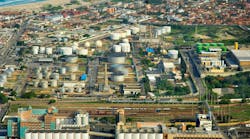Doris Leblond
OGJ Correspondent
PARIS, Oct. 15 -- All 12 refineries are now on strike in France or being shut down gradually by the companies for safety reasons. Total SA started shutting down its six refineries early this week and other refineries are following suit.
Esso SAF's refinery at Port Jerome also is now on strike and its Fos unit is paralyzed due to a strike at the distribution sector.
Petroplus’s refinery at Reichstett has joined in, but not because of the fight against the government's retirement plan: It wants to be told what is to become of the refinery threatened with definite closure.
Faced with the government's determination to go through with its retirement plan, the avowed purpose of the CGT trade union is to “dry up the country,” but other trade unions are also taking part in the protest which have also led to the strikers blocking oil depots around the country.
Transport State Sec. Dominique Bussereau has been striving to have them forcibly released including the Fos depot which is now under guard. Bussereau has been calling on motorists not to panic as he says there is enough petrol to last a month at least.
At the request of UFIP Pres. Jean-Louis Schilansky, Bussereau has allowed the companies to use their reserve stocks, which involve a 10-12% fraction of the 90 days' strategic stocks of 17 million tons—40% crude and 60% products—only available for international emergencies.
Bussereau also has permitted the import of motor fuels for trucks even if they turn out to be below French standards, and authorized petrol trucks to use the highways at the weekend.
Shilansky had assessed oil in the depots on average “at a little over 10 days” before reserve stocks were made available. So far only 100 of the country's 12,500 retail outlets have had to close down thanks to the reserve stocks.
The shutting of Total's Grandpuits refinery has cut supplies to the Trapil pipeline, which supplies the south of Paris as well as its two main airports Roissy-Charles de Gaulle and Orly. The latter still has 17 days’ worth of jet fuel reserves while the larger Roissy airport has enough to tide it over the weekend at least, indicated Transport Petrolier par Pipeline (Trapil).
Not surprisingly the chemical sector also has been hard hit by the strikes, so far mainly by the 3-week strike at the Fos-Lavera hydrocarbon port.
France's chemicals trade union, Union des Industries Chimiques (UIC), indicated that the chemical industry has so far already lost €550 million including €300 in exports. UIC Vice-Pres. Jean Pelin was very worried for what he called “a convalescent industry,” barely recovering from the economic crisis.

